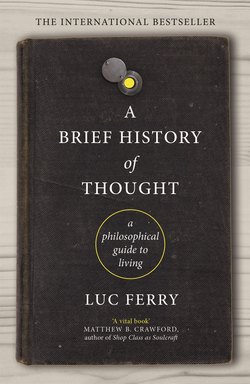Оглавление
Luc Ferry. A Brief History of Thought
Contents
FOREWORD
WHAT IS PHILOSOPHY?
The Question of Salvation
Philosophy versus Religion
The Three Dimensions of Philosophy
‘THE GREEK MIRACLE’
Theory, or the Contemplation of a Cosmic Order
Ethics: a System of Justice Based on Cosmic Order
From Love of Wisdom to the Practice of Wisdom
A Few Exercises in Wisdom
The Burden of the Past and the Mirages of theFuture
‘Hope a Little Less, Love a Little More’
Non-attachment
‘When Catastrophe Strikes, I Will Be Ready’
THE VICTORY OF CHRISTIANITY OVER GREEK PHILOSOPHY
How Religion Replaced Reason with Faith
The Birth of the Modern Idea of Humanity
Salvation through Love
HUMANISM, OR THE BIRTH OF MODERN PHILOSOPHY
A New Theory of Knowledge
A Revolution in the Moral Life
The Difference between Animals and HumansAccording to Rousseau
Three Consequences of the New Distinctionbetween Man and Beast
The Heritage of Rousseau: Man as a ‘DenaturedAnimal’
Kantian Ethics and the Foundations of theRepublican Ideal
Aristocratic and Meritocratic Models
The Origin of Modern Philosophy
From Ethical Questions to the Question ofSalvation
The Emergence of Modern Spirituality
POSTMODERNITY: THE CASE OF NIETZSCHE
A ‘Gay Science’: Free from Cosmos,God and the ‘Idols’ of Reason
A Theory of Knowledge:Genealogy Replaces Theoria
The World as a Chaos Without Cosmos orDivinity
The Negation of the Visible World
An ‘Aristocratic’ Vision of the World
Beyond Good and Evil
The Will to Power
A Concrete Example of the ‘Grand Style’
A New Idea of Salvation
Recurrence: A Doctrine of Salvation without Gods or Idols
Amor fati (Love of What the Present Brings)
The Innocence of Becoming
Nietzsche: Criticisms and Interpretations
AFTER DECONSTRUCTION: CONTEMPORARY PHILOSOPHY
A First Possibility for Contemporary Philosophy
How to Move Beyond Deconstruction
The Advent of a ‘World of Technology’ and theRetreat of Meaning
From Science to Technology: the Disappearance ofEnds and the Triumph of Means
The Passage from Science to Technology:The Death of the Great Ideas
Two Possible Avenues for ContemporaryPhilosophy
The Failure of Materialism
Towards a New Idea of Transcendence
Theoria as ‘Auto-reflection’
The Deification of the Human
Rethinking Salvation
IN CONCLUSION …
FURTHER READING
Отрывок из книги
Luc Ferry is a philosopher, teacher and politician. His writing has been published in twenty-five countries and he has won the Prix Medicis for his essays, as well as the Prix Jean-Jacques Rousseau. He was formerly the Minister for Youth and Education in France. A Brief History of Thought has sold over 300,000 copies in France, and appeared on the bestseller list for thirty-two consecutive weeks.
1 What is Philosophy?
.....
We are going to die: this is a fact. The ripened corn will be harvested; this is a fact. Must we then, asks Epictetus, conceal the truth and refrain superstitiously from airing such thoughts because they are ‘ill omens’? No, because ‘ears of wheat may vanish, but the world remains’. The way in which this thought is expressed is worth our contemplation:
You might just as well say that the fall of leaves is ill-omened, or for a fresh fig to change into a dried one, and a bunch of grapes into raisins. For all these changes are from a preceding state into a new and different state; and thus not destruction, but an ordered management and governance of things. Travelling abroad is likewise, a small change; and so is death, a greater change, from what presently is – and here I should not say: a change into what is not, but rather: into what presently is not. – In which case, then, shall I cease to be? – Yes, you will cease to be what you are, but become something else of which the universe then has need. (Epictetus, Discourses, III, 24, 91–4)
.....
